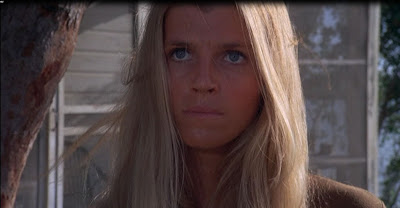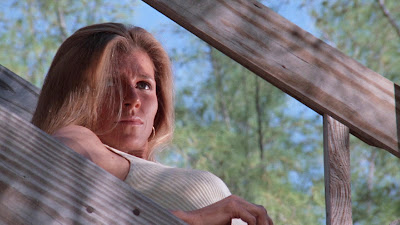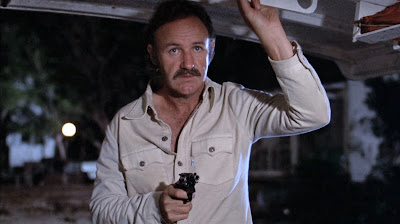For some of us film fans, certain directors come with their own baggage. If I see a David Lean film, I expect sweeping spectacle; If I see Bogdanovich, I expect film school redux. Kubrick is great for icy misanthropy, and Woody Allen is ideal for...well, Woody Allen.
Arthur Penn (Bonnie and Clyde) is a director whose name I so associate with serious themes and deep social commentary that even when he directs a simple little detective drama like Night Moves, it's difficult not to attach to it a profound, pithy significance that may not even be there. In the case of Night Moves, an updated noir bathed in the same chic nihilism as Francis Ford Coppola's The Conversation (1974), the "significance" is there in abundance.
In the summer of 1975, I had just graduated high school and my summer job was ushering at a movie theater in San Francisco while waiting to start film school in the fall. I was thrilled Night Moves opened in the theater where I was employed, allowing me the opportunity to see it countless times (for free!). And it's a good thing, too. for the plot of Night Moves is a real puzzler that benefits from repeat viewings. It was simply icing on the cake that Penn's solemn approach to the detective film genre so suited my post-adolescent self-seriousness.
 |
| Gene Hackman as Harry Moseby |
 |
| Jennifer Warren as Paula |
 |
| Melanie Griffith as Delly Grastner |
 |
| Susan Clark as Ellen Moseby |
 |
| Gene Hackman as private eye Harry Moseby plays chess with himself (knight moves, anyone?) during a stakeout |
Client: "Are you the kind of detective who once you get on a case nothing can get you off it? Bribes, beatings, the allure of a woman's body?"
 |
| A very young Melanie Griffith |
 |
| Marital Discord Clark: "Who's winning?" Hackman: "Nobody. One side's just losing slower than the other." |
WHAT I LOVE ABOUT THIS FILM
Uncompromised heroes can be boring onscreen. Saints and do-gooders always pale next to the more dimensional and colorfully drawn villains. One of the great things Penn does with Hackman's character is that he makes him so flawed in his reason; so limited in his awareness of self; basically, so human in his attempt to defend and uphold his moldy moral code, you can't help but find yourself drawn into his quest. Especially as the mystery he's investigating begins to spiral far beyond anything he initially thought it would be.
Hackman's Harry Moesby joins the ranks of many '70s screen heroes: Jack Nicholson in Chinatown (1974), Warren Beatty in McCabe & Mrs. Miller (1971), and Hackman's Harry Caul in The Conversation. Heroes whose best efforts fail to pan out. Heroes who are no match for the larger systems of corruption they're fighting against. In a world where the bad guys and the good guys are no longer distinguishable by black or white hats, heroism itself can seem like an obsolete virtue.
 |
| "Does it matter, Harry?" |
PERFORMANCES
I like Gene Hackman immensely (The Poseidon Adventure notwithstanding), but at this stage in his career, he seemed to be giving the same performance in film after film. It took Superman (1978) to shake some of the cobwebs off of his acting style. Mercifully, he's always an interesting actor to watch; intelligent and sensitive, yet always a kind of violent tension lurking beneath the surface. But the performance that really caught my eye and captured my attention was Jennifer Warren's.
As the enigmatic Paula, Warren is a modern update of the traditional noir femme fatale. Like those ladies, she's beautiful, earthily sexy, strong-willed, and prone to speak in riddles. I was most impressed by her natural acting style and striking presence. To me, Warren's husky-voiced, no-nonsense sexuality hinted at what feminism might have inspired in the contemporary screen sex symbol.
 |
| Harris Yulin as Marty Heller |
THE STUFF OF FANTASY
Paraphrasing like crazy here, but Raymond Chandler once wrote of detective thrillers that it didn't matter much in the end "whodunit"; what mattered was the successful exploration of human nature and the examination of the darkness at the center of man's soul. In that vein, Arthur Penn's Night Moves succeeds mightily and proves very effective as a dramatization of a man's inner journey. The big mystery and plot twists at the center of Night Moves are plentiful and satisfying, and the film has a really sensational ending. But I doubt if you'd be able to find two people who can agree on just what the hell is going on. But chiefly because of the quirky cast of characters assembled and the uniformly fine performances throughout, Night Moves is a puzzle of a film that works whether or not you can fit all the pieces together.
Paraphrasing like crazy here, but Raymond Chandler once wrote of detective thrillers that it didn't matter much in the end "whodunit"; what mattered was the successful exploration of human nature and the examination of the darkness at the center of man's soul. In that vein, Arthur Penn's Night Moves succeeds mightily and proves very effective as a dramatization of a man's inner journey. The big mystery and plot twists at the center of Night Moves are plentiful and satisfying, and the film has a really sensational ending. But I doubt if you'd be able to find two people who can agree on just what the hell is going on. But chiefly because of the quirky cast of characters assembled and the uniformly fine performances throughout, Night Moves is a puzzle of a film that works whether or not you can fit all the pieces together.
In case you forget you're watching a '70s movie, there's a post-coital scene
where our couple enjoy red wine and fondue in bed
Nobody did heady pretension like '70s directors. Night Moves is a perfectly enjoyable detective thriller when viewed on a strictly surface level, but I love that Penn chose this particular genre to make a heavy statement about the human inability to connect, abandonment, loneliness, betrayal, and the ambiguity of morality.
It's stylish, well-cast, and there's plenty to discover in the plot and in the performances with each viewing. After Bonnie & Clyde, Night Moves remains my favorite Arthur Penn film.
"Do you ask these questions because you want to know the answer, or is it just something you think a detective should do?"
Copyright © Ken Anderson 2009 - 2010









Nice analysis and movie. This is one of my favorite Penn's too.
ReplyDeleteThanks very much! Glad to hear you enjoy this underrated (and rarely shown on cable)film as well!
Delete"It's a puzzler that works whether you fit all the pieces together or not."
ReplyDeleteNight Moves is like the post-modern bookend to 1946's The Big Sleep: you feel satisfied when the ride is over, but you can't recall the schedule of stops the train made . . . only vague images of the scenery that rolled by.
Well put! I've never been able to make heads or tails of The Big Sleep, but that never stands in the way of my enjoying it.
DeleteSaw this one yesterday after reading your post about it :) I have to say I've never been a fan of Gene Hackman but after seeing him in "Secret conversation" and "The french connection" I've grown fonder of him. "Night moves"' intrigue was indeed a bit hard to follow but as you said the ride was really enjoybable. Even though the characters represent archetypes of noir movies the'yre written convincingly enough to bring amibiguity as to who may or not be guilty. I hadn't ever seen Jennifer Warren before but she definitely outshines Susan Clark and Melanie Griffith put together, as the most interesting female character. Really enjoyed it. Next stop "dream lover". ^^
ReplyDeleteHi Ivar
DeleteSo impressed you made good on your promise to check this film out! There really is something so serpentine about NIGHT MOVE's plot. I wonder if a director more skilled in the intricacies of cinema storytelling could have told it in a way that didn't require multiple viewings (my mind leaps to Coppola and how he handles the sprawling saga of the Corleones, or perhaps Hitchcock with his understanding of minimalism).
It always surprised me how much I enjoyed the film even when I didn't always understand what was going on.
Glad to read that Gene Hackman is growing on you a bit. I don't like him in many things either, but he can be an interesting actor sometimes. And of course, Jennifer Warren, such screen presence!
Thanks so much for giving me a follow up mini-review of your first time seeing NIGHT MOVES. I look forward (if you will) to your doing the same for DREAM LOVER. A movie I never get to talk to anyone about because no one has seen it! Thanks, Ivar!
I loved this film from the first -- prototypical seventies paranoiac neo-noir -- and have enjoyed revisits in later years. The plot is indeed challenging and may not ultimately make sense. I'm still not sure whodunit, and some of the sleuthing seems to involve infeasible transcontinental travel. No matter. You are pulled into the undertow.
ReplyDeleteLet me recommend Matthew Asprey Gear's "Moseby Confidential: Arthur Penn's NIGHT MOVES and the Rise of Neo-Noir" (2019). Belying the subtitle, Gear's primary focus is on the Scottish-born screenwriter, Alan Sharp, whose previous credits included ULZANA'S RAID and THE LAST RUN. Sharp, who died in 2013, was at odds with Penn and thought the director nudged the story in a too conventional direction. The loss of Jennifer Warren's post-coital musings linking her personal disillusion and the Kennedy assassination was particularly regretted by Sharp, Warren (obviously), and editor Dede Allen. Anyway, the film is well worth revisiting.
Hello, John -
DeleteThanks for the book recommendation. I love reading deep-dives into the films I love, and now that NIGHT MOVES is finally a title you can mention to people without getting back blank stares of unfamiliarity, this book sounds ideal. I eyed it when it popped up in my Amazon book recommendations, but after having been burned by a few (self)published film monographs that were little more than the result or organized Google research, I usually like to give the books a onceover in a bookstore first.
But your enthusiasm for the tome (it sounds well-researched) may get me to take the leap. This film's inscrutability invites revisiting, and books that delve into the creative process of filmmaking are fascinating.
Thanks for sharing you mini-book review here!